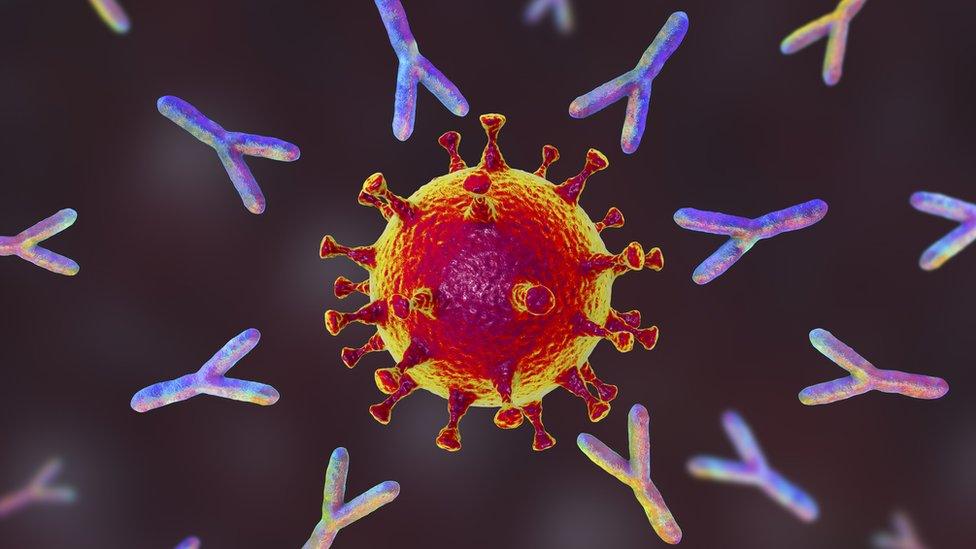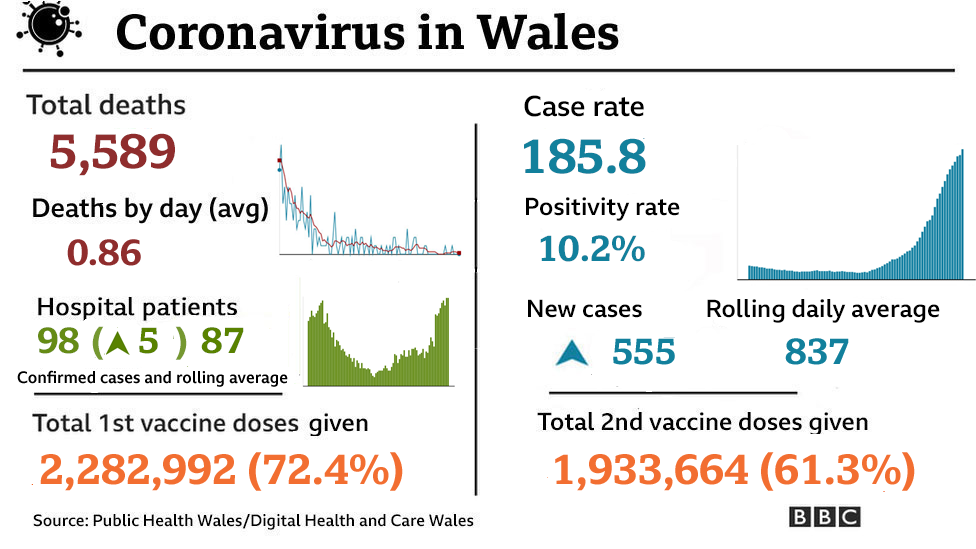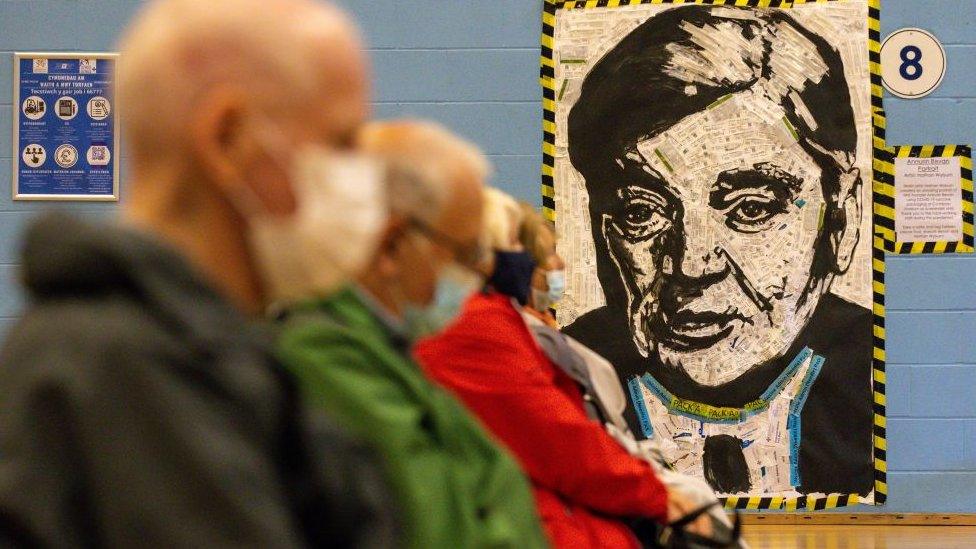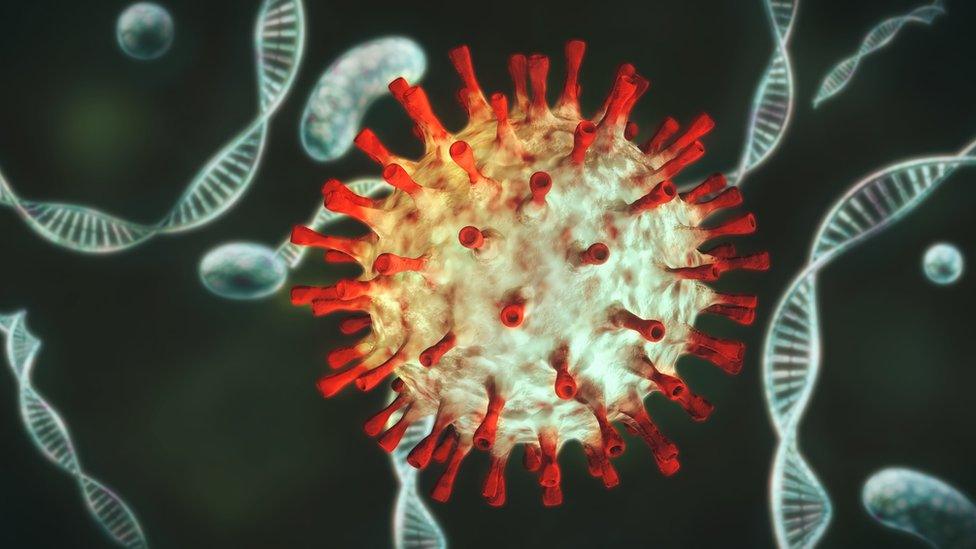Covid antibodies estimated for 92.6% of adults in Wales
- Published
- comments

Antibodies are proteins in the blood which recognise specific infections and fight them off
Well over 92% of adults in Wales have antibodies to protect them against Covid-19, according to estimates by the Office for National Statistics (ONS).
Its model, based on blood samples, suggests 92.6% of adults have either had a vaccine or tested positive for Covid in the past.
The proportion ranges from 71.2% of 16 to 24-year-olds to 92.9% of over 80s.
Antibodies are proteins in the blood that recognise specific infections and fight them off.
The survey is a reflection of the impact of the vaccination programme, although the ONS says finding antibodies alone is not a precise measure of the immunity protection from vaccination.


Updated results are published twice a month and the latest survey shows:, external
An estimated nine in 10 adults, or 92.6% of the adult population in Wales have antibodies - a rise from 86% a month ago
66% of 18-year-olds are estimated to have antibodies, 80.1% of 19-year-olds, and up to 88.4% of 20-year-olds. It reaches 92.1% at age 21
This rises to 94.6% of 25 to 34-year-olds
It rises through the age groups to 96.4% of 35 to 49-year-olds and 95.1% of 75 to 79-year-olds.
However, there is some uncertainty about the estimates for age groups, because of sample sizes.
The proportion of the population covered sees Wales ahead of the other UK nations - with 91.9% covered in England, 90% in Northern Ireland and 88.6% in Scotland.


The ONS analysis showed how antibody positivity fell over time between vaccine doses, and then increased with age groups receiving second doses.
The latest survey, of 1,743 people in Wales, took place in the week ending 4 July.
What's the Covid latest in Wales?
The rise in case rates continues to be driven by positive tests in the under 25s.
We can see that in the latest Public Health Wales breakdown, showing Denbighshire, Conwy, Wrexham and Powys showing high incidence of younger people testing positive, followed by areas like Bridgend.


The highest cases rate for under-25s is in Denbighshire with 878.1 cases per 100,000 - that's 235 cases in the most recent week, 53% of all positive tests.
Sixteen Welsh council areas saw a weekly rise in case rates among under-25s, with the biggest increases in Denbighshire, Conwy and Bridgend.
Across Wales, 48.9% of all positive tests were under 25 in the week ending 15 July.
Today's proportion of younger cases - 53% of all positive tests were under 30.


Wednesday's case rate saw Wales rise to 190.1 cases per 100,000, still lower than all other UK nations and English regions.
Another 941 positive tests were reported on Wednesday - the rolling average over stable data is 856 positive tests a day
The "doubling time" - the time it's estimated it takes for cases to double - has increased to 17 days, indicating a slow down in the case growth.
Denbighshire - with those high number of younger positive tests - is also dominating the highest localised case rates.
There are clusters around Rhyl, Prestatyn and Denbigh.
Newtown South in Powys - after 49 cases in the last week - still has the highest community-level case rate in Wales.


Public Health Wales reported one death - which occurred on Saturday 17th July in Aneurin Bevan health board area in south-east Wales.
There have been six deaths occurring in the last seven days.
Hospital figures showing a rise but below second wave rates
There were 102 patients with Covid-positive tests in hospital beds - a rolling average of 91 for the last seven days. This is the first time in three figures since 6 April. More than half were in north Wales and Cardiff and Vale. Looking back at a similar point in the second wave, by mid-October there were around 400 patients with confirmed Covid a day on average.
There has been a jump in patients with Covid in critical care - this has risen to 25, the highest daily figure in nearly four months. They are still outnumbered five to one by non-Covid critical care patients but the figure is not far off the numbers we saw last autumn.


Admissions are also up - the daily average is now 15. It was eight a week ago). There were 27 admissions on Tuesday, the highest daily figure since late May. Cardiff and Vale (11) and Betsi in north Wales (nine) had the most. Covid now makes up 1.4% of all admissions.
At this rough point in the second wave, Covid admissions were averaging around 100 a day.
Rise in positive tests in care homes
There were 214 positive tests in elderly care homes in Wales - a 140% rise on the previous week and the highest weekly total since early February.
Back in early January, the number hit 1,500 in the peak week.
Routine weekly testing in care homes restarted in September and it is continuing on scientific advice, despite the vaccination programme having now given full doses to 94.9% of residents and 88.7% of staff.
Across Wales, about 35,563 residents and staff were tested in the week beginning 12 July - but this itself was a 60% rise on the previous week.
The vast majority of test processing from care homes is done by Lighthouse labs, but their results do not distinguish between residents and staff. There were 146 positive tests results from these labs - 0.5%.
From tests of residents processed by NHS labs, we can see 48 (1.6%) came back positive, according to Public Health Wales figures. Twenty care home workers tested positive.
It follows on from separate figures from Care Inspectorate Wales which showed a "steady increase" in cases notified at care homes since the start of June.
Related topics
- Published4 July 2022

- Published28 May 2024

- Published26 May 2021
